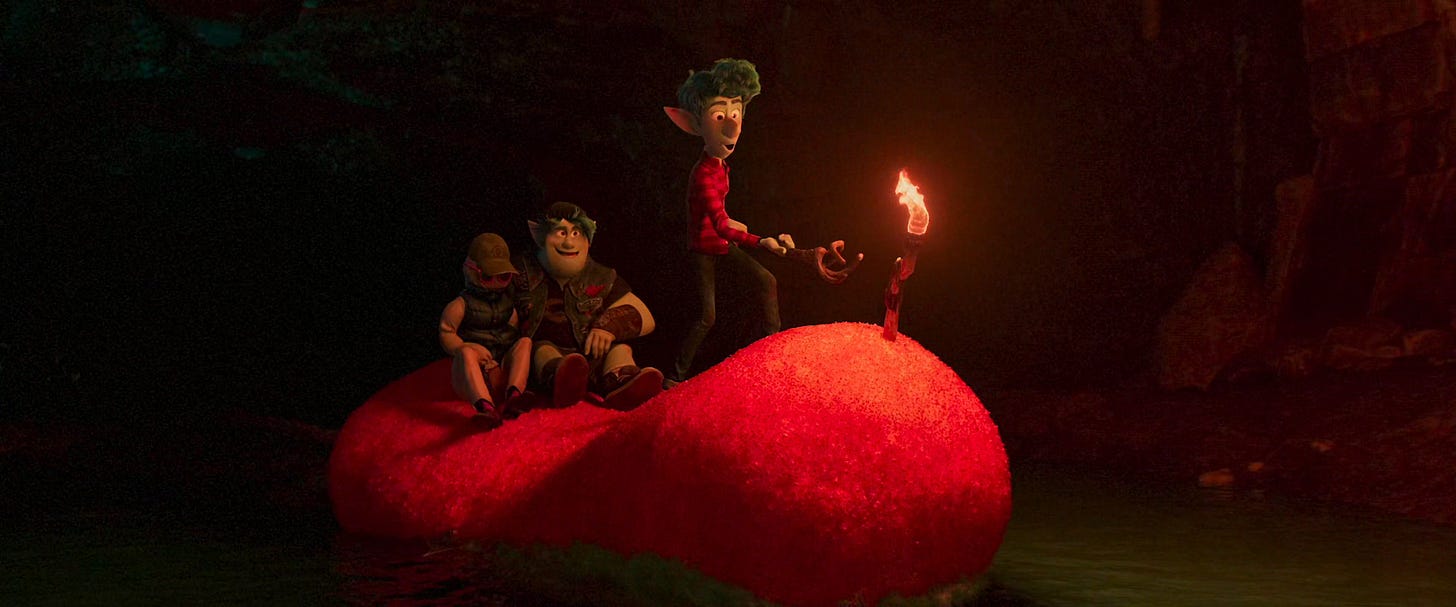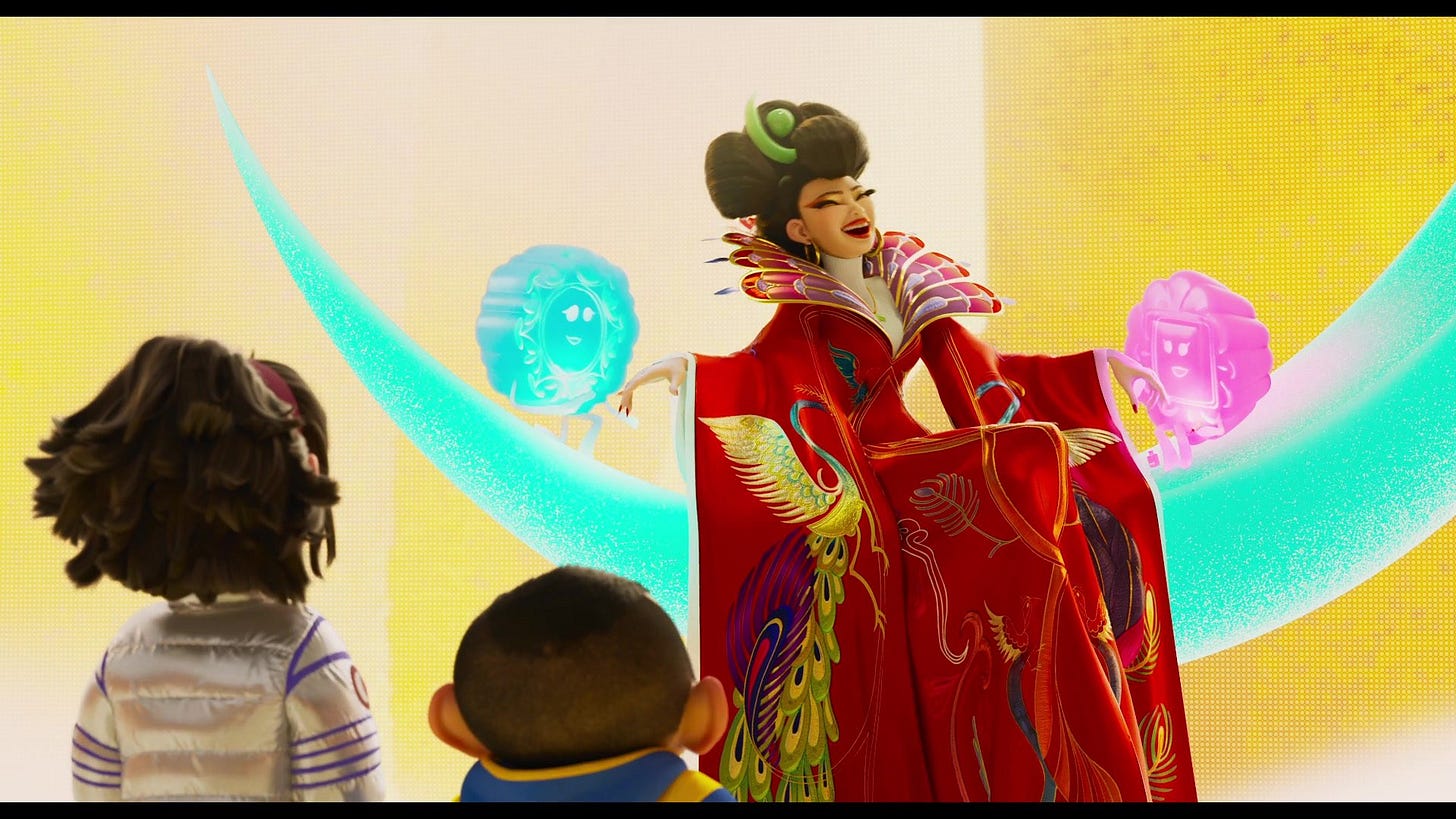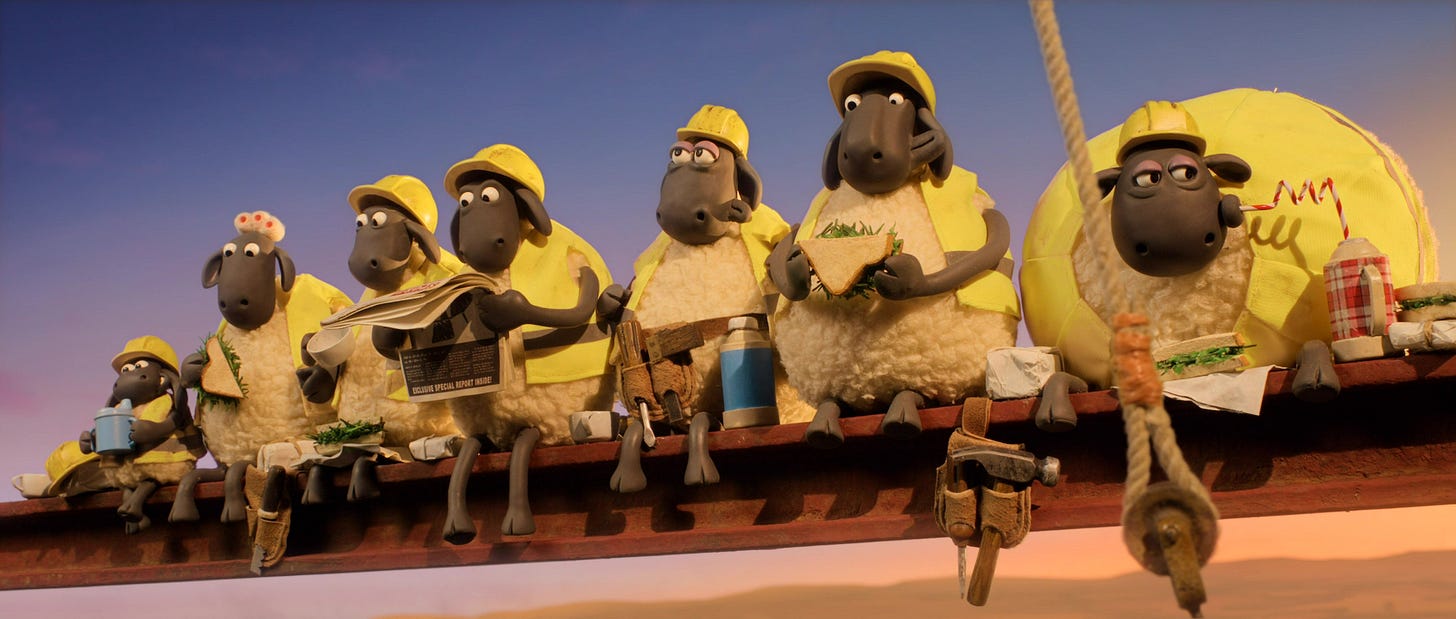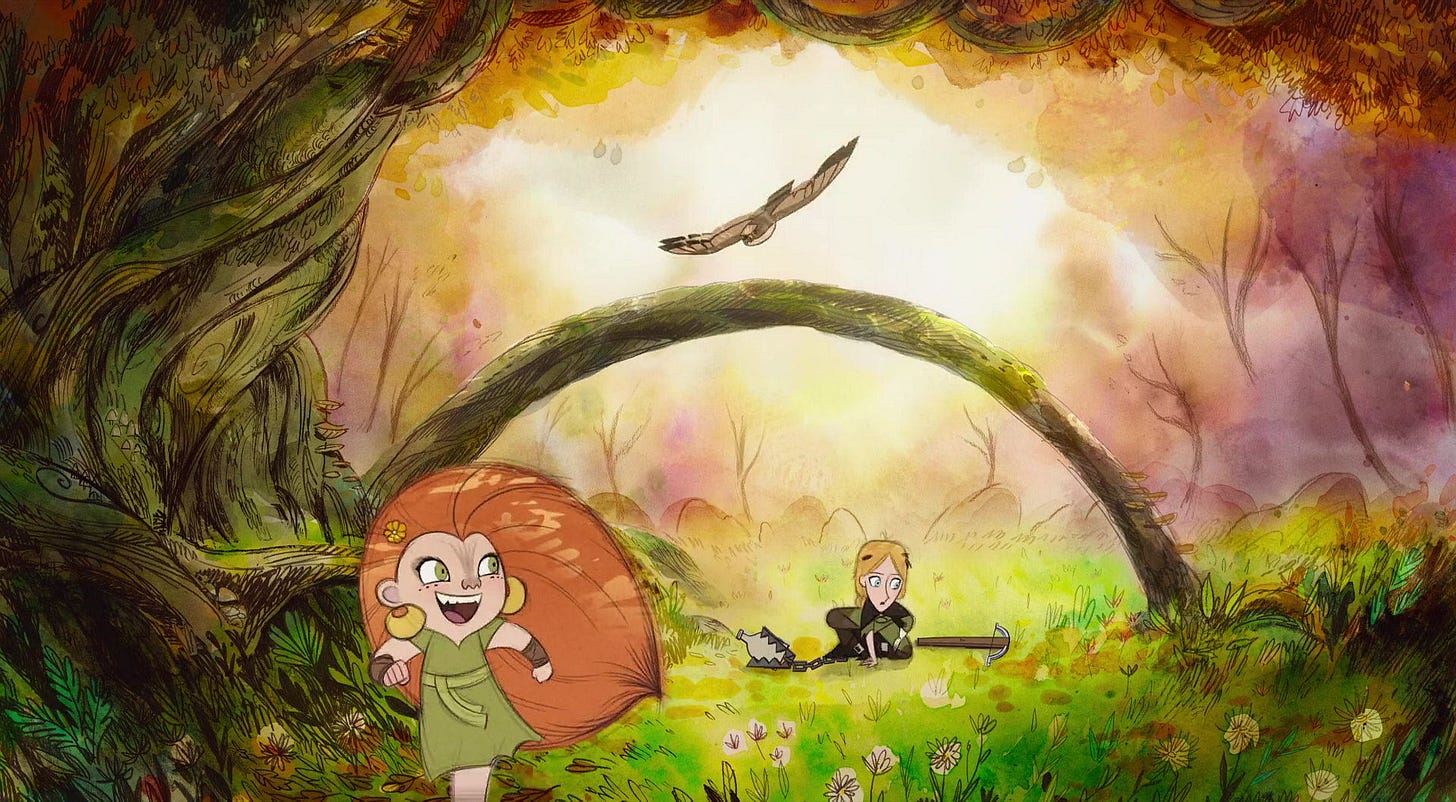Better Animated Feature: 2020
We were all inside anyway. What better way to pass the time than to watch movies?
This post may be too long for email. We recommend clicking through to the website for the best experience.
Eli: Every time I write one of these intros, I sift through the complete list of films submitted for consideration for Best Animated Feature and it’s a good thing I memory-holed this year because re-learning about some of these was a delight.
Among this year’s submissions:
The Croods: A New Age — The long-awaited(?) sequel to The Croods
Trolls World Tour — Another one? Really?
Red Shoes and the Seven Dwarfs — A South Korean Snow White parody starring Chloë Grace Moretz(??) that got in hot water for fat shaming in a marketing campaign
Earwig and the Witch — That weird fever dream 3D-animated Ghibli movie
Scoob! — A Scooby-Doo movie starring Zac Efron(???) as Fred
The SpongeBob Movie: Sponge on the Run — Actually, Paramount withdrew this one from consideration because it wasn’t actually released in the United States until 2021. It’s the only movie in the history of Best Animated Feature to be withdrawn from consideration.
Okay, enough about this nonsense. Let’s look at the real contenders.
The Nominees
Soul (won Best Animated Feature)
Onward (nominated)
Over the Moon (nominated)
A Shaun the Sheep Movie: Farmageddon (nominated)
Wolfwalkers (nominated)
The “Best” Animated Feature: Soul
David: Here’s the thing. Soul is a fantastic watch. There’s a lot of heart, Jon Batiste makes one of the finest scores I’ve seen out of any movie in general—let alone animated movies. It was a movie released at the tail end of a tremendously awful year for most everyone who was alive during 2020, one that was a gift, in some senses.
And yet, the biggest thing I remember from it a few years on is that Tina Fey basically does blackface for two-thirds of the movie. Yikes!
I liked Soul a great deal, but I’d be remiss to not mention what is clearly the movie’s greatest and most fatal flaw—akin to Princess and the Frog, another Disney movie in which a non-white protagonist spends more time non-human than human, most of this movie depicts the central character as either: a blue blob in the afterlife, or a cat. Neither of these things, you will note, are people of color.
Instead, that honor goes to Tina Fey. It’s a bad look, one that has aged like milk with time, and as much as I enjoy this movie, it’s a really challenging block to move past.
I enjoyed the movie—and can certainly understand why it received the laurels that it did. I can also understand how people might happen to take issue with its plaudits. Let’s get into some of the other nominees.
The Other Animated Features
Onward — Eli
Nominated
I’ll begin this review the same way I began the Pixar Pint for this movie last year: it’s impossible to discuss Onward without first mentioning its release date. March 6, 2020. That’s about a week before shit really started hitting the fan, but alarm bells were already going off worldwide and theaters were already seeing reduced ticket sales all over America. Onward saw an opening weekend domestic gross of $39.1 million, which is awful; those are Good Dinosaur numbers. The next weekend, it made a paltry $10.6 million, and the weekend after that, every theater in America was closed, so Disney released it for digital download for $20, a patently ridiculous price given that 1) that’s like twice the price of a movie ticket and 2) they also announced they were releasing it to stream on Disney+ two weeks later.
This all branded Onward as doomed from the jump while also making it painful to view in hindsight as a product of one of the most traumatic eras of everyone’s collective life. But y’know what? In the one weekend for which we have somewhat useful data, Onward was the #1 movie in the US by a mile, and in the weird liminal space weekend between freedom and lockdown, it remained at #1 and beat out three new Hollywood releases. There was hype for Onward, and there’s a pretty obvious case to be made that it’s been unfairly dismissed.
The movie follows elf brothers Ian (Tom Holland) and Barley Lightfoot (Chris Pratt), who live in an urban fantasy land where magic was once commonplace but has since been replaced by convenient technology. On Ian’s 16th birthday, their mother (Julia Louis-Dreyfus) gives them a gift from their father, who died when Barley was very young and before Ian was born. The gift is a powerful gem with which they can perform a visitation spell and bring him back from the dead for just one day, but the spell goes awry and the gem is destroyed midway through, bringing back only his legs. Ian, Barley, and their father’s legs immediately set out on a quest to find another gem so they can complete the spell before it expires.
All in all, it’s pretty standard Pixar fare. You’ve got your big-name voice actors, you’ve got your relatable theming, you’ve got your fun visual gags, and you’ve got your tear-jerking emotional beats. How much you like this movie is probably going to hinge almost entirely on whether you can stomach over an hour of Chris Pratt nearly uninterrupted, as Ian and Barley’s arc takes up the wide majority of the runtime. If you’re tired of him, you would be forgiven for dismissing this movie entirely, but personally I’m a fan. I don’t even think he turns in that great a vocal performance in this movie, but he naturally brings a certain congenial energy that not many others can pull off with maximum effort. There’s a reason he’s so bankable.
The quest itself is a lot of fun. I said in Pixar Pints that it reminded me of Percy Jackson, but it also just reminds me of long roadtrips that I myself took in adolescence and early adulthood. Pixar is really good at coming-of-age stories and this one is no different; the resolution is really well done and the ending has made me tear up even on repeated viewings. Holistically, I believe this to be one of Pixar’s best efforts, and I really do think it’d be more fondly remembered if its release cycle wasn’t so irreparably fucked up.
And I think Disney agrees with me because boy did they course correct. Nine months and a whole lot of world history later, Pixar released Soul directly to Disney+ on Christmas Day. And, like, obviously Soul is viewed so favorably because it’s a good movie, but it sure did help that it was presented on a popular streaming service as a Christmas gift after the most nightmarish year imaginable.
It was a good present. Soul is an artistically brilliant and philosophically thought-provoking film that immerses the viewer in some of the best music ever to accompany an animated movie. It’s extremely easy to see why this movie was such a success among both audiences and critics…which makes its fatal flaw infinitely more frustrating: it’s somehow the second time in this series I’m upset at a major studio for trying to make Tina Fey do Black things.1
That’s not the only thing wrong with Soul, to be clear. I also noted in Pixar Pints that it’s “a majority-Black movie of which the fabric wouldn’t have changed if the characters were white” and that “it’s not very clean storytelling”, and I stand by both assertions. But both of them stood out to me less the second time I watched it, and I felt I was able to better appreciate the several positive aspects of the film. Those positive aspects ended up netting Soul a Best Animated Feature award, and given all of the above, it’s clear why the Academy gave it the nod over Onward.
But me? I still think Onward is the better movie. In botching the Black representation, Soul gets a large part of what it sets out to do completely wrong. It’s similar to my gripe with LAIKA’s The Boxtrolls (2014), which wants to be about minority/queer oppression while also making its primary antagonist an evil crossdresser. While Onward does have a similar pitfall in its misguided, throwaway inclusion of a lesbian cop, the scale on which that negatively affects the movie is much smaller than Soul’s shortcomings. Otherwise, Onward has a clear idea of what it wants to do and does exactly that very well.
In Pixar Pints, I gave Onward a 9/10 and Soul an 8/10. I retain both ratings.
Verdict: Better Animated Feature
Over the Moon — Eli
Nominated
You might not know Glen Keane’s name but you certainly know his work: he’s a legendary animator who spent most of his career at Walt Disney Animation Studios. His most iconic work came in the Disney Renaissance, during which he designed and animated the titular mermaid Ariel in The Little Mermaid and served as a supervising animator for the title characters of Beauty and the Beast (Beast), Aladdin, Pocahontas, and Tarzan.
Keane left Disney in 2012 to focus on directing—something he was supposed to do with Disney on 2010’s Tangled, but had to abandon due to health issues. He began with shorts, directing Duet in 2014 and then collaborating with Kobe Bryant on 2017’s Dear Basketball, which was based on Bryant’s 2015 letter to The Players’ Tribune announcing his retirement. Dear Basketball won that year’s Academy Award for Best Animated Short Film (which has existed a whole lot longer than Best Animated Feature, having been awarded since 1932).
That leads us to Over the Moon, Keane’s feature directorial debut, released directly to Netflix here in 2020. The movie follows 13-year-old Fei Fei (Cathy Ang)—whose mother died four years prior and whose dad is remarrying, to her chagrin—and her eight-year-old soon-to-be-stepbrother Chin (Robert G. Chiu) on a lunar quest to find the mythical moon goddess Chang’e (Phillipa Soo). On the moon, Fei Fei seeks to prove to her father that love is eternal and that he shouldn’t forget her mother / his first wife, Chin seeks to prove himself a worthy sibling to Fei Fei, and Chang’e seeks to revive her long-lost lover Houyi.
Over the Moon covers several common children’s animation themes: loss of a parent or loved one, learning to accept change, siblings learning to get along. While it handles all of these themes well—poignantly at times—it doesn’t really break any new ground in this arena. It deserves a lot of credit for telling a traditional Chinese story to Western audiences via an all-Asian voice cast, but the way it tells this story is so Americanized that it’s kinda easy to forget what exactly you’re watching. You can tell Glen Keane spent nearly 40 years at Disney; his first feature film has all the hallmarks of a standard Disney musical.
That definitely works to the film’s detriment. You’ve got Cathy Ang singing a soaring power ballad and trying desperately to sing the name “Chang’e” (pronounced “chunga” with a soft G) in a way that doesn’t sound awkward. Then Phillipa Soo takes the lunar stage and starts singing Lady Gaga songs, followed by a prepubescent Robert G. Chiu rapping while kicking her ass in ping pong. It’s a deeply unfitting set of musical numbers, one that I’d say distracts from the story far more than it adds to it.
Over the Moon doesn’t really come close to stacking up to Soul, a movie for which the music works perfectly in tandem with everything else and pushes the final product above and beyond. Soul’s shortcomings are certainly not to be entirely dismissed, but no singular thing about Over the Moon stands out to nearly the same extent as Soul’s score, animation, or aesthetic. All in all, it’s not a fair fight.
Verdict: Not a better animated feature
A Shaun the Sheep Movie: Farmageddon — Preston
Nominated
When we last looked at Aardman Animations, I conducted a bit of a postmortem on the studio’s greatest run of financial success. Every feature-length production they put out between 2000’s Chicken Run, their film debut, and 2015’s Shaun the Sheep Movie grossed over $100 million, with three Best Animated Feature nominations and a 2005 victory for Wallace & Gromit: The Curse of the Were-Rabbit along the way. Since then, they’ve taken in about $50 million apiece on a pair of theatrical releases, then moved to Netflix for their two most recent films. With direct-to-streaming movies starting to take on a rather worrying direct-to-TV feel, it’s hard to say if Aardman will ever step back into the limelight.
So…do they deserve to? This is a studio that’s always been somewhat overlooked and brushed aside, despite consistently putting out quality films with a remarkably reliable track record. I’ve seen everything they released during that 2000-2015 run, some of them multiple times, and I think it’s fair to say there isn’t a bad or even mediocre movie in the lot. That’s a standard of excellence that even Pixar and modern Disney haven’t maintained for such a lengthy stretch—has it continued past Aardman’s peak box-office success?
Well, admittedly, this is the only post-2015 film I’ve seen from the studio. Early Man, which preceded it, and Chicken Run: Dawn of the Nugget, which followed a few year’s later, both earned significantly worse reviews (though they still generally outscored 2006’s Flushed Away, which I’m confident calling solid). But if I’m just looking at A Shaun the Sheep Movie: Farmageddon, I’d hesitantly say that it fits in fairly well with their earlier filmography.
This isn’t necessarily a masterpiece. I wouldn’t call it a rehash of its prequel, but I would call it more of a reskin: the trappings of the story have changed, but the essential character dynamics and emotional arcs are largely the same. Shaun and Bitzer get out of their depth and need to find a way to reunite and return home, a single-minded villain pursues them to the point of comical obsession, an adorably helpless one-off character plays a major role, and all the while the farmer remains preposterously oblivious to the entire plot. There are a few structural differences—this film’s guest protagonist, Lu-La, plays a larger role than the original’s, Slip, did; the other sheep are mostly uninvolved in the story until the third act—but most of the changes are more about the surface-level shift from wild-animals-in-a-big-city jokes and set pieces to alien-in-a-small-town ones. Fundamentally, the structure of the story and the main emotional core (a character conflict between the fun-loving Shaun and the killjoy Bitzer) are unchanged.
That’s not really a bad thing, for the most part. A lot of Aardman’s consistency lies in repeatability: most of their films promise a longer, and perhaps slightly more serious, version of the shorter films that everybody already loves. The narrative that animated movies can and should have complex emotional throughlines is a valuable one for the most part, but this studio’s work is a reminder that there is some value in lighter fare, too. An Aardman film will probably never earn a 10/10 from me unless they delve into deeper territory, but I would enjoy cinema a lot less if I only considered absolute perfection to be “good”. There’s a place for simple, lighthearted family movies that don’t try to do too much, and that’s what Farmageddon represents to me.
I make a point of that because, not for the first time in this series, I’m rewarding ambition over consistency here. Soul isn’t a vastly better or worse movie than Farmageddon, and the fact that it deservedly took home Best Animated Feature over this film shouldn’t be interpreted as a statement that Farmageddon is objectively worse in every way. Without taking into account what this award is ultimately about…I think Soul is still probably a better pick, but I don’t feel particularly strongly about that. They’re both flawed, yet ultimately decent attempts at what they want to be, and I’d still gladly rewatch either one. But if artistic merit is a factor at all, and I think it probably should be for an Academy Award…
There’s a place for movies like Farmageddon, yes. And in certain years (like 2012, when I’d say The Pirates! Band of Misfits was probably the best nominee), that place might be first in line for this award. In this year, though—when Pixar put out its first truly ambitious work since Coco—it doesn’t really have a shot.
Verdict: Not a better animated feature
Wolfwalkers — Leah
Nominated
Wolfwalkers is the third entry in Cartoon Saloon’s Irish Folklore Trilogy, alongside The Secret of Kells and Song of the Sea, both of which were also nominated for Best Animated Feature. This film follows Robyn, a younger girl who has moved to Kilkenny from England with her father, a hunter trying to capture the wolves around the town. Robyn wants to help her father, slipping outside the town walls in search of the wolves. But she gets more than she bargained for when she meets Mebh, a young wolfwalker—a human who takes the form of a wolf while they’re asleep—protecting her pack.
Having watched all three movies in the trilogy, and having been a huge fan of Cartoon Saloon since The Secret of Kells was their only movie, I can confidently say that Wolfwalkers is the culmination of their growth as a studio and the best movie they’ve made yet.2 The plot is engaging and well-paced. The art is absolutely gorgeous, taking inspiration from the natural and cultural beauty of Ireland. The animation is fluid, bringing the film to life and showing that 2D animation is far from gone. The soundtrack helps bring a lot of emotion to the film and is masterfully composed.
Wolfwalkers does a good job developing and supporting its themes, using mythology as a way to represent the damage done by English colonization in Ireland. It’s also a story about learning to recognize when authority is leading people in a morally wrong direction and standing up against that, even at a threat to one’s own safety or security. It’s a good moral wrapped up in an engrossing story.
When comparing Wolfwalkers to the 2020 winner, Soul, I could draw some of the usual comparisons. Wolfwalkers is a small-budget indie film going up against a big-budget Pixar film. Wolfwalkers is a foreign film, while Soul was made in the USA. I still think what Cartoon Saloon has done with significantly fewer resources than big studios like Pixar is impressive and should be commended.
Beyond that, when I consider the merits of Soul, I do find a lot to love about the film. It has some of the best art in all of Pixar. Visualizing abstract concepts like death and human souls takes a lot of creativity, and Pixar pulled it off very well in this film. It has a good message about appreciating the beauty of life and the concept of purpose. I think this movie could have been one of Pixar’s best if not for what may possibly be the worst creative decision ever made in a Pixar movie.
Having Tina Fey voice a black man for a portion of the movie due to the body swap situation just feels tone deaf at best and offensive at worst. I shared this article in Pixar Pints, and I’ll share it again here to highlight the problems Soul has in regard to representing Blackness. For all the good music and visuals and messages in Soul, it’s not enough to overcome such a fundamental failure in how the Black lead of the movie is portrayed.
I could probably nitpick several creative decisions in Wolfwalkers if I sat down and watched the film a few times and spent a lot of time analyzing every little thing, but there’s nothing anywhere close to as egregious as having Tina Fey voice a Black man. While both movies have great art and visuals and music, Wolfwalkers does not have Soul’s baggage with cultural representation. It succeeds in telling an Irish story in a way that respects the experience of being Irish, while Soul stumbles in the way it portrays its Black lead.
Overall, Wolfwalkers has more thematic clarity and cultural respect, making it fitting to judge a:
Verdict: Better Animated Feature
Running Tally
2001: 2 better (2 nominated; 3 snubbed)
2002: 1 better (4 nominated; 0 snubbed)
2003: 1 better (2 nominated; 2 snubbed)
2004: 0 better (2 nominated; 1 snubbed)
2005: 2 better (2 nominated; 2 snubbed)
2006: 3 better (2 nominated; 2 snubbed)
2007: 3 better (2 nominated; 1 snubbed)
2008: 0 better (2 nominated; 0 snubbed)
2009: 2 better (4 nominated; 2 snubbed)
2010: 3 better (2 nominated; 4 snubbed)
2011: 1 better (4 nominated; 0 snubbed)
2012: 4 better (4 nominated; 1 snubbed)
2013: 2 better (4 nominated; 0 snubbed)
2014: 3 better (4 nominated; 1 snubbed)
2015: 2 better (4 nominated; 0 snubbed)
2016: 5 better (4 nominated; 1 snubbed)
2017: 0 better (4 nominated; 0 snubbed)
2018: 0 better (4 nominated; 0 snubbed)
2019: 4 better (4 nominated; 0 snubbed)
2020: 2 better (4 nominated; 0 snubbed)
TOTAL: 40 better (64 nominated; 20 snubbed)
Finally, we split the room. Encanto on deck; join us in two weeks!
Next: 2021 (4 nominated; 0 snubbed)
The other was in DreamWorks’ Megamind (2010). At this rate, Illumination is going to repeat the same mistake in 2030.
Editor’s note: strong agree. —Eli














